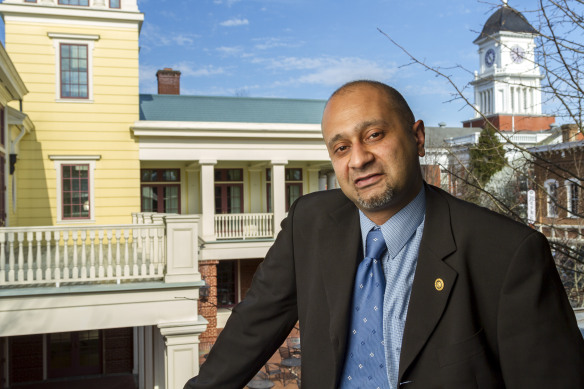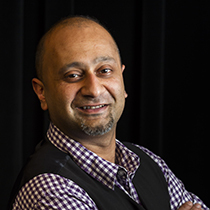
Kiran Sirah Singh at the International Storytelling Center in Jonesborough, Tennessee, USA.
By Kiran Singh Sirah, a 2011-13 Rotary Peace Fellow and president of the International Storytelling Center in Jonesborough, Tennessee, USA
I’ve been having lots of inspiring conversations with my fellow Rotarians recently. As a Rotary Peace Fellow, I’ve found it so helpful to connect and brainstorm with my colleagues from the program. I think many of us individually and institutionally have had our thoughts crowded out by our focus on survival early in this crisis.
The question marks we all face remain overwhelming. But as we have talked with one another, it has shifted our attention on collaboration and supporting one another. We’ve been focusing on how we can help not just ourselves and each other in our own personal and professional circles, but also make a difference in the wider world.
 I’ve been at the International Storytelling Center since 2013, but stories and storytelling have touched my work in peacebuilding and conflict resolution long before that. I often worked with individuals and communities in deep distress in the UK. Years ago in Northern Ireland, I used my firsthand experience with racism and violence to support a community dealing with sectarian conflict between Catholics and Protestants. I met with many courageous people who made themselves vulnerable, sharing stories to find common ground.
I’ve been at the International Storytelling Center since 2013, but stories and storytelling have touched my work in peacebuilding and conflict resolution long before that. I often worked with individuals and communities in deep distress in the UK. Years ago in Northern Ireland, I used my firsthand experience with racism and violence to support a community dealing with sectarian conflict between Catholics and Protestants. I met with many courageous people who made themselves vulnerable, sharing stories to find common ground.
Common ground can mean different things. It doesn’t have to be physical or geographical. It can be the common ground of a shared experience, as well as the universality in the human journey we share: joy, suffering, pain, and sorrow. Common ground is perhaps one of our most compelling and useful tools we have to support each other through this pandemic and build more resilient communities.
With common ground in mind, I reached out to my Rotary colleagues (some of whom I knew already, some of whom I’d never met) to ask a question: What can we all do to help each other?
The response was electric. A few days later, one of my colleagues set up a series of Zoom video conference calls. At one point, we had three different one-hour sessions in a single week, spaced across different time zones so people from around the world had options to participate. The format was open, designed to let us talk about whatever was on our minds.
In each session, I led a brief storytelling-related overview to talk about how we can best share our experiences. We talked about our personal challenges, how we could support one another, and ultimately how we will help others. But underneath those big questions was a good opportunity to share personal stories and find common ground. We listened and learned from one another, and it was a great way to be exposed to other people’s experiences—more raw and personal and interesting than what we see on TV or other forms of media.
A story told directly from its source has a certain power to create a sacred space, in person or virtually. And it let us think about the crisis without getting overwhelmed by its scale and scope.
- A colleague from Colombia told me about working in a community where she’s using art (especially illustration and graphic design) to support families. She talked about mental health and how it’s impacted when our lives are flooded with conflict and tension.
- Another colleague who works with First Nations peoples in Canada told a folk story about a bear in hibernation: when a bear has done its work, it goes to sleep, hibernating for winter. Communities have been using this folk tale to help children understand and cope with the quarantine, and she wondered if the idea could be used in a broader context.
- An Italian Rotary Peace fellow talked about what it’s like in Italy right now, where people from certain ethnicities have faced stigma and prejudice. We learned a lot from what he had to say, but he also said it helped him to share. Listening without judgment is a powerful act.
The pandemic has been difficult in so many ways, but it has also opened doors to new forms of collaboration and mutual support. We can all use our own stories to heal and help others by open-ended group strategizing. What can you share with, and learn from, others in your personal and professional networks? Share your thoughts below.
https://blog.rotary.org/2020/06/04/finding-common-ground-during-the-pandemic/
